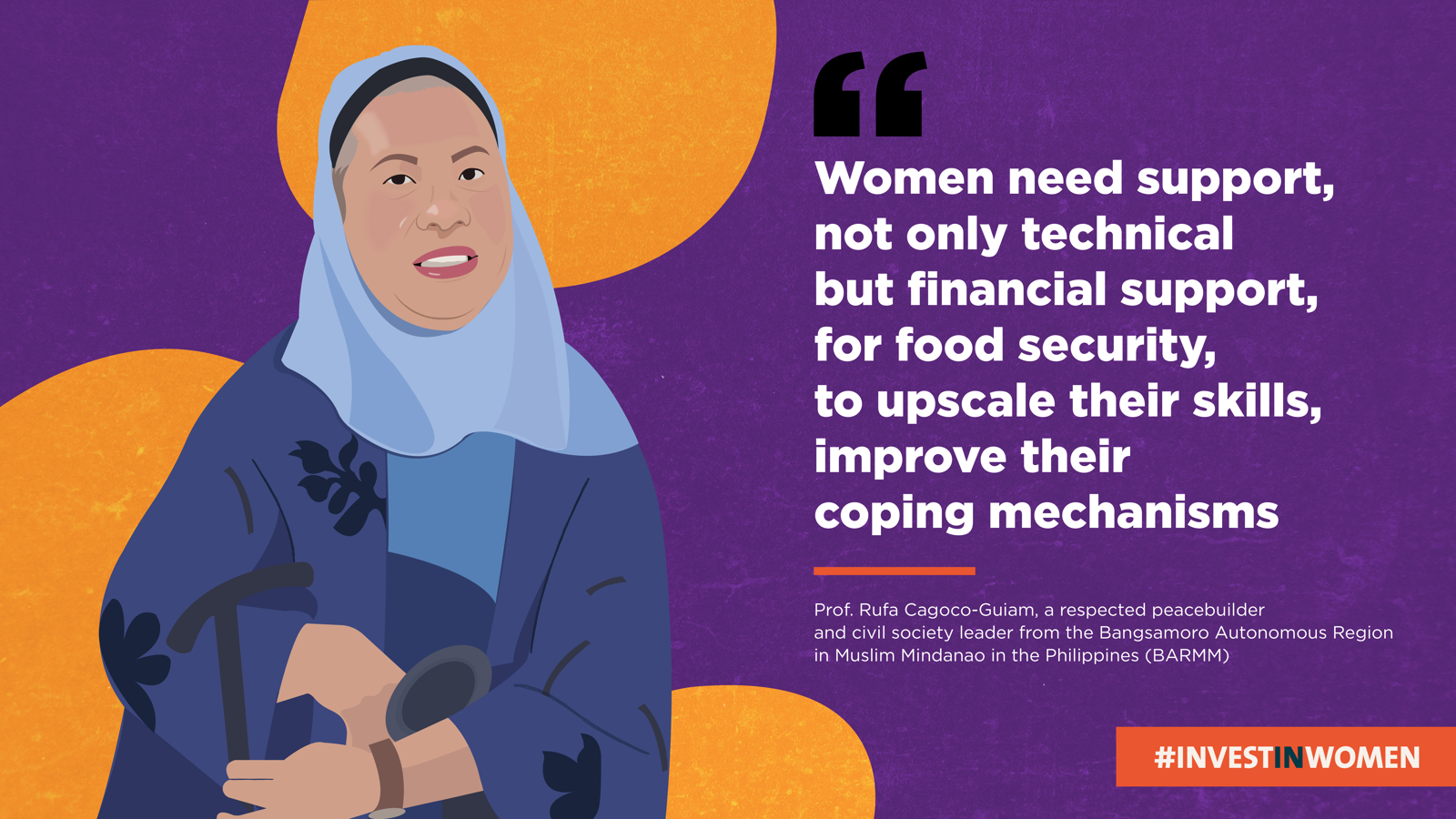Time is now to invest in women, peace and climate security in Asia and the Pacific
Date:

With gender, climate, peace and security firmly on the international agenda following the UN Climate Change Conference (COP28), UN Women is advocating for greater investment in women as agents of peace and resilience in Asia and the Pacific.
The COP28 Declaration on Climate, Relief, Recovery and Peace includes a call for enhanced financial resources for climate adaptation and resilience building in situations of fragility, conflict, or severe humanitarian needs and underlines the importance of social safeguards.
As the need for climate action is increasingly recognized to address the root causes of conflict and vulnerability, the value of women's and girls' meaningful participation and leadership at the frontlines of peace, climate action and natural resource management is evident.
This is among the growing areas of need UN Women highlighted for International Women’s Day 2024 and its theme Invest in women: Accelerate progress.
At a dialogue organised by UN Women and Finland’s Ministry for Foreign Affairs at COP28 in Dubai, Prof. Rufa Cagoco-Guiam, a respected peacebuilder and civil society leader from the Bangsamoro Autonomous Region in Muslim Mindanao in the Philippines (BARMM) explained why investing in women is crucial to address the escalating climate-related security risks at the community level.
“In the Bangsamoro region, women have committed themselves to be at the forefront of rescue efforts and relief and recovery after climate-related disasters and armed conflict, which in some cases take place at the same time. It’s always the men who take the credit yet it’s the women who initiate and facilitate extending assistance to vulnerable groups. The women need support, not only technical but financial support, for food security, to upscale their skills, improve their coping mechanisms, even first aid, because they’re the first responders,” said Prof Cagoco-Guiam, an Associate Professor at Mindanao State University.
Women, Peace and Security Agenda
Within the Regional Framework Towards Peaceful, Inclusive Societies in the Asia-Pacific region, UN Women is leveraging the women, peace and security (WPS) agenda as the most effective framework for considering and advancing climate, peace and security in Asia and the Pacific.
Valuable insights can be gleaned from the implementation of the WPS agenda, particularly in areas of accountability and finance, which encompass direct support to civil society organizations. These lessons are especially pertinent in light of the slow progress in climate finance in crisis contexts.
“We’re at a turning point where the nexus of gender equality, climate action, and peacebuilding is gaining recognition. This convergence signifies a powerful fusion of the women, peace and security agenda with global climate action,” said Norul Mohamed Rashid, UN Women’s Regional Policy Advisor on Governance, Peace and Security for Asia and the Pacific.
“Adequate, accessible and flexible financing are needed to support women peacebuilders and their networks in addressing climate-related security risks, and to advance local women-led solutions contributing to conflict prevention, climate resilience and for sustaining long-lasting peace,” noted Ms Rashid.
Support for the Pacific
With the launch of the Women's Peace and Humanitarian Fund (WPHF) climate funding appeal initiative, women civil society partners in the Pacific will be supported to lead local interventions and response efforts to escalating climate-related security risks in their communities.
“The Women's Peace and Humanitarian Fund serves as a testament to the impact of targeted, flexible support for local women-led peace initiatives. It highlights a key lesson: local women's groups possess invaluable insights and solutions for peacebuilding and resilience. Financially empowering these groups not only amplifies their voices but also ensures their crucial participation in peace processes, demonstrating the importance of localizing peace efforts and leadership,” said Sophie Giscard d’Estaing, Officer-in-Charge, WPHF Secretariat.
Growing evidence base
The climate security portfolio of the UN Peacebuilding Fund, a key supporter of UN-led climate, peace, and security efforts, has a significant portion of projects dedicated to the needs of women and girls.
Its Thematic Review on Climate Security and Peacebuilding 2023 showcases promising outcomes, acknowledging the emerging nature of the gender-climate-security field. For example, a project in Papua New Guinea is among those shown to highlight the critical role of women's participation in natural resource management and climate change adaptation, pointing towards transformative opportunities and improved practices.
Emphasizing the value learned from the WPS agenda, the review advocates for more profound integration of gender, climate and security considerations, and for further investment in projects with a focused gender-climate-security learning approach to capitalize and expand upon the field's growing successes.
Accurately quantifying the allocation and impact of gender-sensitive climate finance is an area of concern for UN Women, including a need for standardization and improvement in the use of gender and conflict indicators to better leverage the co-benefits of climate action for gender equality, women's empowerment, and sustaining peace.
A forthcoming study to be published by UN Women on gender-responsiveness of climate finance for sustaining peace will contribute to the evidence base demonstrating the need to invest in women. Highlighting a glaring underrepresentation of gender-targeted initiatives, the study finds that a mere 0.035% of global climate finance commitments directly addressed the issues of gender, peace, and security, spotlighting the scarcity of initiatives that focus on this 'triple nexus'.
More information
- Climate Security and Gender – UN Women in Asia and the Pacific
- In Focus: UN Women at COP28
- COP28 Declaration on Relief, Peace and Recovery